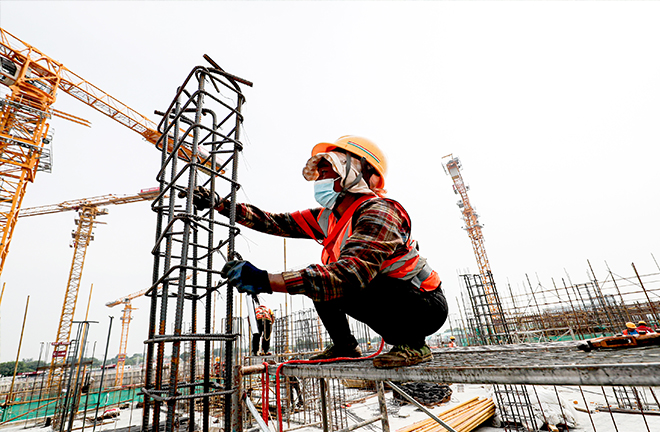People’s wellbeing at core of CPC’s governance

A worker binds steel bars at a construction site to build placement housing for residents in Tongzhou District, Beijing, which is a key project the district implements to improve people’s wellbeing. Photo: CFP
“The people” is a predominant theme throughout the report to the 20th CPC National Congress. In light of the next five years being critical to China’s efforts to build a modern socialist country in all respects to a good start, the Congress report included “improving the people’s wellbeing and raising their quality of life” as a separate chapter, covering improving the system of income distribution, implementing the employment-first strategy, improving the social security system, and advancing the Healthy China Initiative. Scholars noted that this has both established the direction and provided basic guidelines for ensuring and improving people’s wellbeing in the new era.
The report also highlighted encouraging demographic and economic figures. “China’s life expectancy has reached 78.2 years, its per capita disposable annual income has risen from 16,500 yuan to 35,100 yuan, and more than 13 million urban jobs have been created each year on average over the past 10 years. We have built the largest education, social security, and healthcare systems in the world. These achievements have allowed us to make historic strides in making education universally available, bring 1.04 billion people under the coverage of basic old-age insurance, and basic medical insurance for 95 percent of the population.”
These outstanding figures demonstrate the all-around improvement of people’s wellbeing in the new era over the past decade. These improvements are a testament to the Party’s steadfastness in its purpose of serving the people wholeheartedly.
“The system of income distribution is the foundational system for promoting common prosperity. Employment is the most basic component of the people’s wellbeing. The social security system provides a safety net for people’s livelihoods and helps ensure social stability. People’s health is a key indicator of a prosperous nation and a strong country,” according to the report.
Zhao Qingjie, a professor of Marxism at China University of Political Science and Law, said that the four aspects regarding income distribution, employment, social security, and people’s heath are interrelated, progressive, and inseparable parts of an organic whole.
Income distribution
However, each of these four parts has its own emphasis. In terms of improving the income distribution system, the report proposed improving the personal income tax system while keeping income distribution and the means of accumulating wealth well-regulated, and protecting lawful income, adjusting excessive income, and prohibiting illicit income. Among them, “keeping the means of accumulating wealth well-regulated” is a newly proposed concept. Tao Wenzhao, deputy dean of the School of Marxism Studies at Renmin University of China, said the proposal of this new concept is a scientific response to the continuous improvement of China’s national income levels, and it is in line with this stage of the country’s economic development. With great theoretical significance to improving the socialist distribution system, it is conducive to advancing common prosperity.
Employment first
In terms of implementing the employment-first strategy, two measures are noteworthy: “improving the system for creating jobs by encouraging business startups and supporting and regulating the development of new forms of employment.” The expression “new forms of employment” first appeared in the Communique of the Fifth Plenary Session of the 18th CPC Central Committee in 2015. After more than seven years of development, the report to the 20th Party congress reiterated this term, indicating that the CPC Central Committee attaches great importance to, and highly affirms, the development of new forms of employment.
Zhang Chenggang, an associate professor of labor economics at the Capital University of Economics and Business, said that China’s job market has been stable and improving over the past five years. New forms of employment play a significant role in expanding the scale of employment, improving the quality of employment, and injecting new momentum and vitality into the development of China’s labor market.
Social security
The social security system is the basic institutional guarantee for ensuring and improving people’s wellbeing and maintaining social fairness. With regard to improving the social security system, the report to the 19th CPC National Congress proposed “strengthening the social security system,” while the report to the 20th CPC National Congress emphasized “improving the social security system.”
Han Keqing, a research fellow from the National Institute of Social Development at the Chinese Academy of Social Sciences (CASS), said the change from “strengthening” to “improving” reflects that various social security policies and measures have been enhanced, including an initial pattern of urban-rural coordination, constantly improving institutional systems, expanding scope and coverage of protection, steadily rising levels of benefits, and increasing fiscal investment.
People’s health
Good health is a universal priority for all human beings. It concerns the future of the country and the people. Chen Qiulin, deputy director of the Research Center for Health Industry Development at CASS, noted that the report to the 20th CPC National Congress gives strategic priority to ensuring the people’s health, and clarifies that the CPC’s central task will be to lead all Chinese people in a concerted effort to realize the Second Centenary Goal of building China into a great modern socialist country in all respects and to advance the rejuvenation of the Chinese nation on all fronts through a Chinese path to modernization. This means that the strategic importance of work in the people’s health will continue to grow in the future.
Edited by CHEN MIRONG
